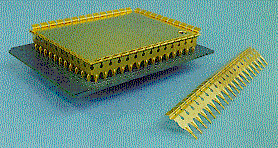Copper Blocks RFI Both Ways
 A microprocessor, sheathed in copper from Instrument Specialities, is protected from radio frequency interference.
A microprocessor, sheathed in copper from Instrument Specialities, is protected from radio frequency interference.Errant radio waves are very disruptive--and copper blocks both their entrance and their emissions. With copper shielding, such vital devices as pacemakers and defibrillators cannot be disrupted by radiated energy waves, which can also interfere with radio or TV broadcasts. Copper shielding can also frustrate spies who try to tap the confidential information inside computers by decoding the radio signals they broadcast.
Portables Need More Copper
The growing use of light-weight plastic enclosures, especially in portable instruments, requires a new approach. RFI-sensitive components inside plastic cases must be wrapped in copper, according to Ron Brewer, an expert on suppression of RFI and vice president of Instrument Specialities, a leading supplier of copper elements to block RFI.
In addition to providing a variety of forms to block RFI, Instrument Specialities operates a test facility in Placentia, California, where equipment can be tested and certified as RFI-free or RFI-proof. Company experts also identify RFI problems and suggest solutions.
The requirement to block RFI originated with the military, but it is now just as important in commercial and industrial equipment, according to Ken Gazarek, chief engineer of Equipto Electronics, Inc., a leading manufacturer of metal enclosures for electronic equipment.
Gazarek reports that concern about RFI is growing overseas, too, "The Common Market has set standards for suppression of RFI very similar to our own."
Remote Spying
Spies can tap confidential computer information by monitoring the radio waves normally emitted by computers. To block such candlestine spying, the government requires shielding, which is made of copper.
At first the shielding was designed into each piece of equipment. This approach, known as Tempest, is very costly. Tempest grade PCs cost four to five times as much as ordinary PCs, according to Brewer.
To cut costs from the Tempest approach, the government shifted a decade ago to shielding entire rooms and even entire buildings to block radio emissions. Successive generations of computers can be used in such shielding rooms without costly Tempest measures.
Shielding manufactured by the Fortifiber Corporation is composed of thin sheets of copper laminated to kraft paper and called Copper Armored Sisalkraft. The laminate can be attached to wallboard like wallpaper using an industrial strength mastic adhesive, according to Frank Banisch, Fortifiber sales manager. To prevent radio waves from exiting through windows, they are fitted with copper screens and bronze window frames.
The laminate comes in three weights: one, two and three ounces per square foot. The tree-ounce weight is most commonly used for shielding. The laminate is made in rolls up to 60 inches wide by 120 feet long. The copper foil used in the laminate is made by electrodeposition.
After the laminate is attached (copper side out), the seams are closed with a copper tape coated with solder. The tape, also supplied by Fortifiber, comes in widths of two or four inches and is applied with a wide soldering iron.
Entire Buildings Shielded
The laminate may also be attached to buildings during construction before the facade goes on. The outsides of two National Security Agency buildings at Fort Mead, Maryland were sheathed in this manner during construction. Some Central Intelligence Agency buildings were designed in the same manner.
In addition to their counterespionage role, the laminates are also used:
- To block the entrance of disruptive RFI into laboratories equipped with sensitive electrical measuring instruments,
- To prevent dispersion of radio energy from high intensity diathermy equipment in hospitals and medical offices, an application for which Fortifiber sells the laminate in Holland and the U.K. as well and the U.S.,
- To flash around windows in home construction.
The tree-ounce laminate costs about $150 per 100 square feet, according to Banisch. The material is not flame retardant; flame retardant versions are available at extra cost.
Equito Electronics, Inc.: Aurora, IL 708/897-4691
Fortifiber Corp.: Attleboro, MA 800/343-3972
Instrument Specialties: Delaware Water Gap, PA 717/424-8510
Also in this Issue:
- Copper Screens Repel Clogging Mussels
- Copper Alloys Tools Prevent Dangerous Explosions
- Engine Renewal System Relies on Brass Fittings
- Copper Blocks RFI Both Ways
